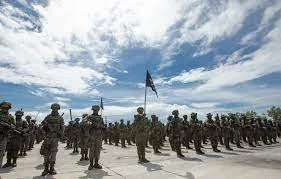"Spying on Sisi's opponents" an Egyptian-American citizen accused by Washington of aiding Egypt's interests
Pierre Gerges, 39, a dual national of Egypt and the United States, is accused of acting as an agent for a foreign government without notifying the US Department of Justice, and of conspiring to do so.
US authorities have arrested a New York man on charges of acting as an undercover and unregistered agent for the Egyptian government, including by sharing information with US law enforcement officials about political opponents of President Abdel Fattah el-Sisi, the US Department of Justice said Thursday.
It was not immediately clear if he had a lawyer who could comment on his behalf.
An indictment of six counts was made public Thursday, alleging that Pierre Gerges, a dual national of Egypt and the United States, acted under the "directions and control" of Egyptian government officials between at least 2014 and 2019.
Prosecutors say he used his ties to US law enforcement to gather non-public information that he shared with Egyptian contacts.
Gerges, who lives in Manhattan, is also accused of arranging meetings between Egyptian and US law enforcement officials, and arranging for Egyptian officials to attend police training in the United States.
In April 2017, according to the indictment, Gerges shared with a US law enforcement officer information about anti-Sisi activists he had received from an Egyptian government official.
Months later, prosecutors say, he sent an identification card of a "designated" person he had received from an Egyptian government official to a US law enforcement official, then shared with Cairo the questions he had obtained from the US official.
An article on the ink.com website describes a tourism promotional trip to Cairo for about 100 police officers from New York City and Nassau County, New York, co-organized by Pierre Gerges, identified as a banker at Capital One of Egyptian origin.
The article quoted Gerges as saying that the trip "carried an important international message of hope and cooperation."
A bank spokeswoman did not immediately respond to a letter seeking comment, but a person familiar with the case, who was not authorized to discuss it by name, confirmed on the condition of anonymity that Gerges worked for the bank.
In recent years, the US Department of Justice has strengthened its criminal enforcement of laws requiring registration with the Department of Justice for people who work within the United States as agents of foreign governments.
"The Department of Justice will not allow agents of foreign governments to operate in the United States to prosecute and gather information about critics of those governments," Assistant Attorney General Matthew Olsen, the Justice Department's chief national security official, said in a statement.
"Truth Social" Trump's social networking network will be launched on February 21
The media group of former US President Donald Trump announced the launch of its social network, "Truth Social", on February 21.
The “Truth Social” social network, which has similar features to Facebook’s communication tools, will be available for download starting February 21, according to an announcement by the Trump Media and Technology Group on the App Store. next.
Trump had recently decided to launch this private network after Facebook, Twitter and YouTube banned his accounts during the month of January 2020, accusing his supporters of inciting his supporters to storm the Capitol, to prevent Congress from certifying the victory of his rival, Joe Biden.
Before that, he had millions of followers on the social media platforms that he used to address his supporters, as well as to communicate his political messages and even important decisions.
So, today, Trump considers that creating his own “Truth Social” network will be a way to “stand up to the tyranny of the tech giants,” as he puts it.
"Cheap" marches a strategic threat that raises fears of armies in the world
Whenever the US military finds a solution to confront the drones, the low-cost weapon that causes great losses, new advantages emerge that give it superiority over defense systems worth billions of dollars, so how does the United States face what it considers the "biggest threat"?
The head of the US Central Command, General Kenneth McKenzie, considers drones the "most worrisome threat" the US military has faced since the emergence of improvised explosive devices in Iraq 15 years ago, according to a report by the Wall Street Journal.
Advanced marches have enabled irregular forces and national armies alike to attack strategic targets at a very low cost compared to other modern weapons.
Last April, General McKenzie said, "I'm very concerned that now anyone can get the drones and use them as a weapon very simply," noting that they can be bought online or assembled, to be effective in launching attacks that cause heavy losses.
The report mentioned examples of those strategic goals, such as the Houthis’ attack in Yemen on expensive armored vehicles, military installations, oil refineries, and civilian ports and airports, in addition to the Iranian-backed Iraqi militias’ use of drones to launch raids on the US Embassy in Baghdad and the recent attack on the residence of the Iraqi Prime Minister. The marches even reached royal facilities in the heart of the Saudi capital, Riyadh.
One of the major challenges faced by the US Army because of the "Drones", is that the army focuses in the formation of its defenses on the threat of possible wars with powers that have advanced armies such as China and Russia, and the United States is pumping billions of dollars in the purchase and manufacture of advanced defense systems in preparation for this, including missiles and giant aircraft carriers, But these massive systems could not counter an organized attack with a series of drones, which confused the whole equation.
Therefore, the United States is currently racing against time to develop defensive systems using lasers and microwave technology, which can target a large number of marches in a short time, and a new US Army office, established in 2020, has taken on the task of searching for solutions to confront the "Drones".
One of the solutions that the United States created in 2016, using hand-held jamming devices, made it difficult to identify the target on the drones, in order to confront the drone attack launched by the terrorist organization ISIS in Iraq, but that solution did not last long.
The ability of drones to evade interference quickly improved, and the development of drones to launch an attack through a swarm of them controlled by artificial intelligence, exacerbated the problem.
The US Air Force is currently seeking to develop a "high-powered microwave" weapon to counter drones, and one of the companies working on this says that the integration of microwave technology with artificial intelligence, will allow rapid targeting of individual or directed drones as swarms.
At the same time, political scientist and counterterrorism researcher, Dr. Austin, stresses that progress in anti-drone technology must be made systematic and continuous, as "while the Pentagon continues to invest billions of dollars in creating defense systems, armed groups continue to innovate as well to get away from those systems." He told the Wall Street Journal.
Austin describes it as "a continuous dance of adaptation, as the battle between organized armies and armed groups will always be governed by creativity and anticipation of the next move."





